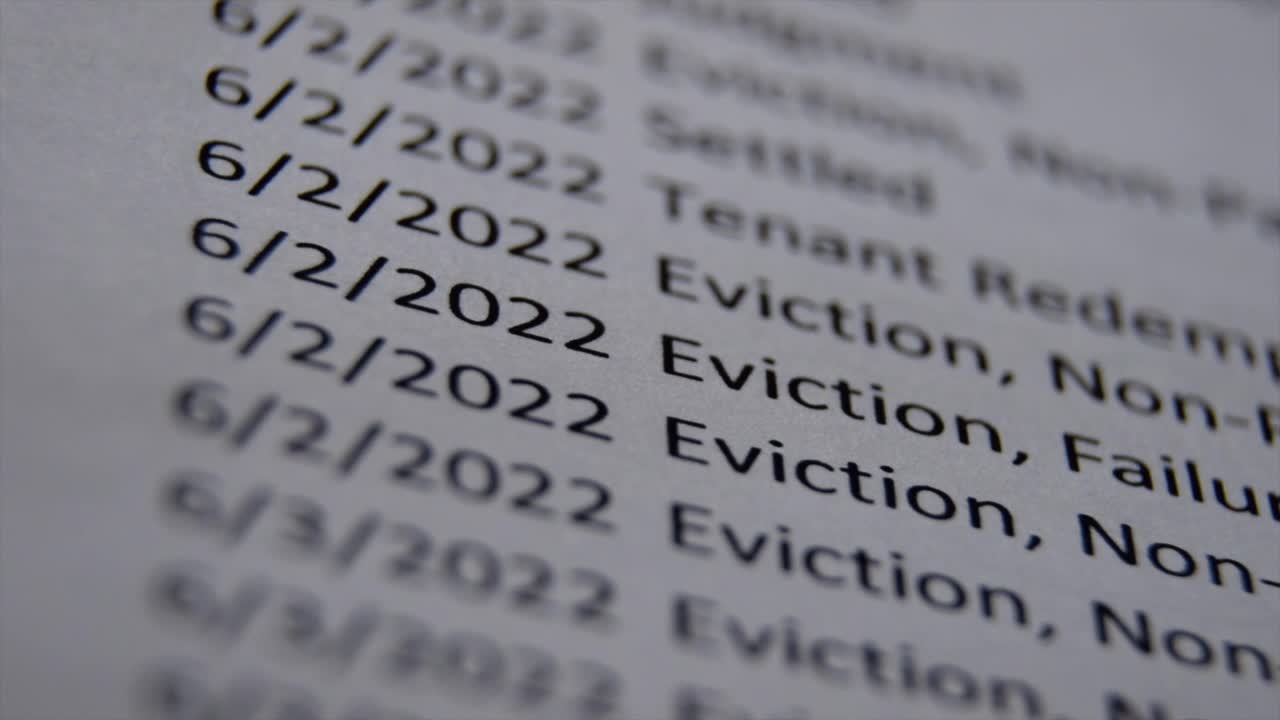Hennepin County sees high number of eviction filings as it works to address case backlog
[anvplayer video=”5164496″ station=”998122″]
Hennepin County Housing Court is dealing with an influx in eviction filings.
There were 881 filings in January alone, according to Chief Judge Toddrick Barnette. It’s outpacing the 840 slots they currently have available for hearings each month.
“What we’re experiencing now is a higher number of filings for evictions than we did pre-pandemic,” Barnette said. “It’s very surprising to me.”
It comes at a time when the court system was hoping for relief. Housing Court has been under pressure since the eviction moratorium, which went into effect in March 2020 and ended in June 2022.
“I thought after the moratorium ended, we would have a spike in eviction cases because we just have a lot of cases pending,” Barnette said. “But I thought that once we really put some resources in housing that we would see that number decline — and I think we did initially, but it’s picked back up.”

(KSTP)
There was a spike in cases when the pandemic protections ended in June, which led to delays last September and October.
“Back in the fall, we were definitely seeing a lot of backlogs in the court cases,” said Rachael Sterling, a housing attorney with the nonprofit HomeLine, which provides legal aid to renters.
Before the pandemic, it typically took about two weeks for a case to get in front of a judge for an initial hearing. That turned into months after the moratorium lifted.
“It was about three months, maybe even four months in some cases,” Sterling said.
5 EYEWITNESS NEWS requested data from the Minnesota Judicial Branch of all evictions filed since June 1. It showed more than 60% of evictions filed in June in Hennepin County weren’t resolved until at least September, with many extending into October.
While the data didn’t explain why, a few cases stretched into December, and two still weren’t resolved by the end of January. Typically cases can be either be resolved at the initial hearing or extended due to a continuance or a trial.
According to attorneys we spoke to, the number one reason for an eviction filing is nonpayment of rent.
Sterling explained, in some cases, the backlog was beneficial to tenants.
“More time means that there’s more likelihood the tenant is going to be able to find resources to be able to pay the past due amount and get caught back up on their rent,” she said. “It also is more time to stress but also to plan, ‘OK, where am I going to pivot to? Where am I going to land?’”
On the other hand, the time can be costly for landlords.
“They’re still occupying the premises. We may have turned away our clients may have turned away other reputable good residents,” said attorney Doug Turner, a partner at Hanbery and Turner, a law firm that represents more than 100 landlords and property managers. “When the courts delay the summons, my clients feel like its justice delayed. And when we get to court, they owe such a large amount, we can never really get them back on track.”
Turner explained there are also safety concerns if the tenant is being evicted for other lease violations, including breaking the rules, violence, disturbing tenants, or harassing the management.
“It’s a real problem because we can’t get the really bad violators, the really bad residents out,” Turner said.
Hennepin County District Court added another judicial officer, a referee, in the fall to handle cases to address the backlog.
“We were all guessing what the filings were going to be once the moratorium was lifted,” Barnette said when we asked whether the referee should’ve been added sooner. “I don’t think we were in a position to know what we were going to have come in.”
He added, “We were trying to get that referee in at a sweet spot.”
The court system also returned to in-person hearings in January in an effort to speed up the process. Barnette explained it takes fewer staff members for in-person appearances than remote hearings.
“There were people who said we don’t want to go back in person,” he said. “At the end of the day, I really thought that in order to bring more balance to where we were, this had to be done.”
There was improvement after those changes were made, but amid this latest wave of cases, a Minnesota District Court system spokesperson told 5 EYEWITNESS NEWS it is still taking about five weeks for an initial hearing after an eviction is filed.
Barnette said it’s hard to know when they’ll be back down to a two-week time frame.
“We weren’t prepared for a spike in housing cases,” he said. “We’re going to have to watch what happens over the next three or four months and try to figure out is there something additional we need to do.”
He added, “The way to address an increase in filings is to provide more space for hearings so we would have to talk about what is our capacity to do that, and then do [attorneys] have capacity to do it?”